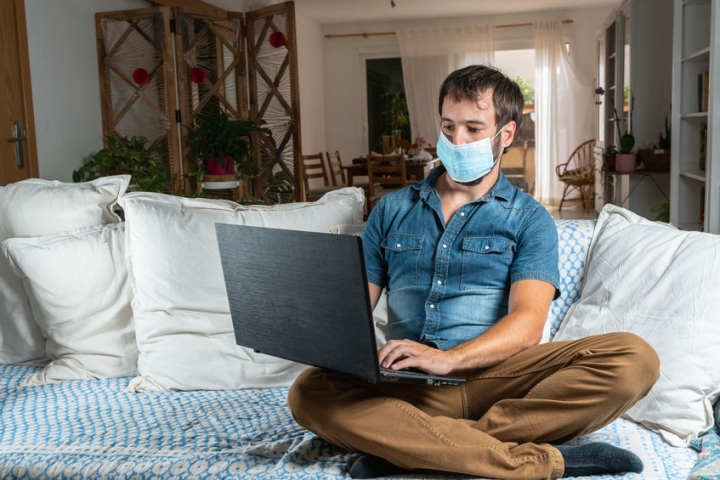

How to care for your health and well-being in these COVID times
The global pandemic that is COVID-19 is scary and chaotic, and it can quickly wreak havoc on emotional health and overall well-being. It’s easy to become overwhelmed with everything that’s going on, and restrictions such as lock downs and social distancing can take their toll. Feeling this way is a normal reaction, but now more than ever it’s important that all of us take the time to care for our health and well-being. Here’s how.
Invest in your nutrition
In stressful situations - even when you have extra time on your hands - it’s surprisingly easy to ditch the healthy options and gobble down fast food or more sugary snacks then you would normally indulge in. But there’s nothing better than nutritious, healthy homemade meals, so make sure your refrigerator and pantry are stocked up with food items that balance your body’s nutrients like protein, healthy fats and lots of fresh fruit and vegetables. This will help you to maintain a healthy food habit, so make sure they are always on your list before heading to the supermarket.
Keep yourself active
In some parts of Australia, you may not be able to get to the gym, but you can still keep yourself fit and active. It’s fine to go outside to run, walk or even bike as long as you keep a safe distance, and wear a mask if that’s not possible. If you prefer to stay indoors, there are many gyms and fitness instructors offering online virtual sessions these days. You can sign up to one of those or you can also opt to take advantage of things you already have at home. Use wine bottles as weights and strong chairs for step-ups. There are also loads of exercises that don’t need any equipment, such as squats, lunges, burpees, planks, push-ups, sit-ups, etc. The bottom line is, keep your blood flowing by being active.
Stay connected
If you’re in lockdown, or if you’re staying at home to reduce the risk of contracting Coronavirus, the feeling of isolation can sometimes lead to depression and anxiety - and that’s why it’s essential to stay connected. There are many ways to do this. Reach out to your family and friends through messaging apps, such as WhatsApp, Skype, Zoom, Facebook messenger, and of course, the old fashioned phone calls. If your network is small, you could also consider joining virtual community groups and find opportunities to grow your connections and find new friends. You’ll be surprised how much this can positively affect your mental and emotional health.
Get enough sleep
Stress and sleep are surprisingly, always interconnected. People who are stressed can’t get enough sleep, and people who have trouble sleeping tend to get stressed. The bottom line is it’s important to get enough sleep - with or without a pandemic. Your first step is to avoid overexposure to news and chaos from the outside world. While the world out there is still very topsy-turvy, create your own quiet world inside your home.
This could be a small space somewhere in the living room or in your bedroom where you can meditate and calm your mind. Do some yoga exercises if you can. Having some plants or scented candles around you can also help you to relax. Remember, a calm mind usually leads to a night of good sleep, and getting enough sleep is one of the best self-care routines you can do.
Keep your surroundings clean
The ultimate way to care for your health and well-being is to avoid getting sick in the first place. When viruses such as COVID-19 are on the loose, the best way to shoo them off is by keeping your surroundings clean and practicing social distancing or wearing a mask. It’s been much publicised that the virus can stay on many surfaces for up to 72 hours, so make sure you regularly wash your hands and clean high touch-point areas such as your door and cupboard handles, taps, benchtops and desks. Remember, prevention is always better than cure.
Invest in yourself (and your financial health)
The number one rule of thumb when it comes to caring for your health and well-being is to invest in yourself. Now more than ever, it’s important to focus on what can make you healthy - in mind, body, and spirit. As the old saying goes “health is wealth”, so being aware of how financial health and mental well-being are connected is really important. So if you're struggling with debt and need help to get back in control of your finances - invest in yourself (as well as your mental health) and seek help. Start the conversation; arrange a FREE no-obligation assessment with a debt specialist today. What have you got to lose but your debts!